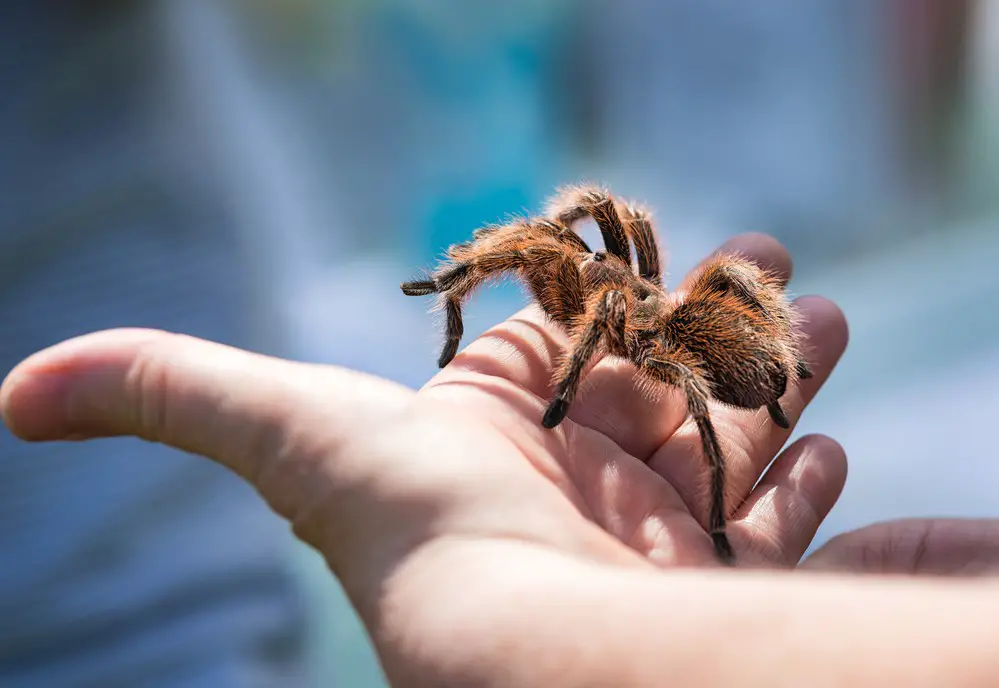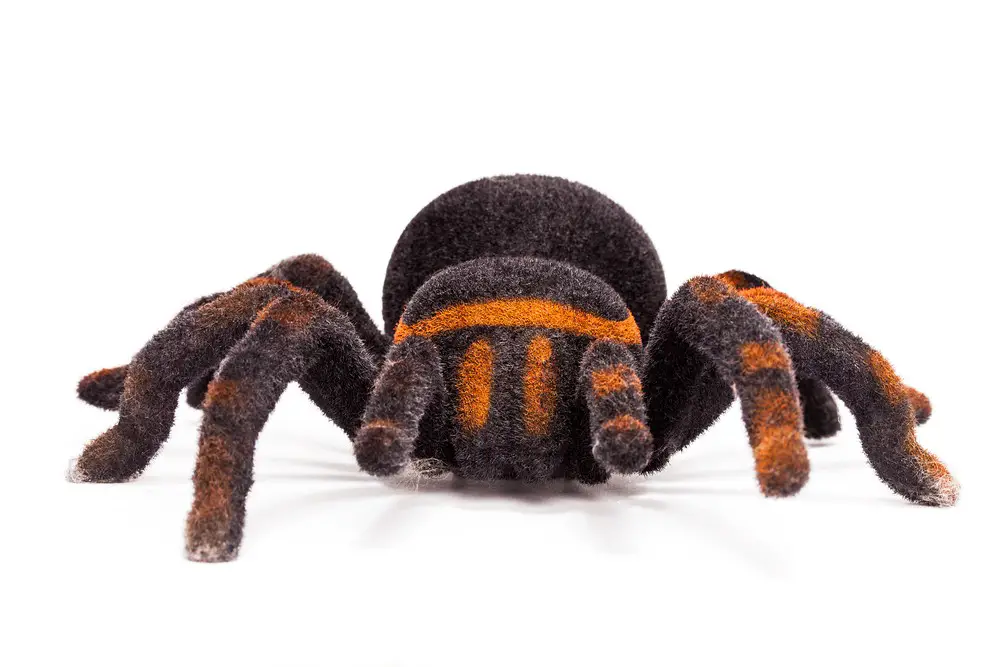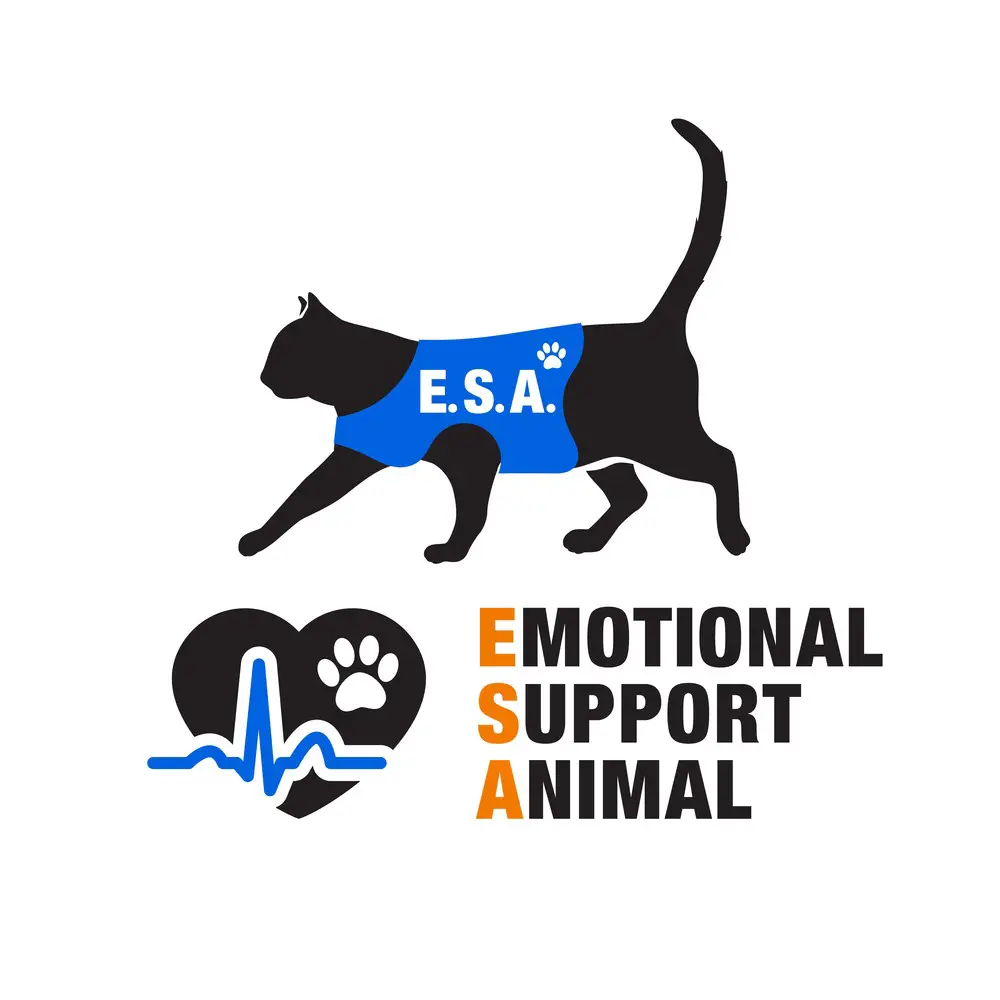As a BetterHelp affiliate, we receive compensation from BetterHelp if you purchase products or services through the links provided
Emotional support animals (ESAs) come in various shapes and sizes, providing comfort and companionship to individuals who need it most. One unconventional ESA that has gained attention recently is the emotional support spider. Often misunderstood, these creatures serve as a source of relief and happiness for many people.
For those struggling with anxiety, depression, or other mental health struggles, emotional support spiders can offer a unique sense of solace. Tarantulas, in particular, are known for their gentle and low-maintenance nature, making them an attractive option for those needing an ESA. Though not typically recognized as an ESA, they’re increasingly considered a favorable emotional support option.
Key Takeaways
- Emotional support spiders, particularly tarantulas, provide unique comfort and companionship for individuals with mental health challenges.
- These unconventional ESAs can offer solace and relief to those struggling with anxiety, depression, and other emotional issues.
- Despite not being widely recognized, emotional support spiders are increasingly acknowledged for their positive impact on mental health.

Understanding Emotional Support Animals
Dogs as ESAs
Dogs are the most common emotional support animals (ESAs), providing love and companionship to help you manage your mental health. They’re loyal, intuitive, and can sense your emotions, often offering comfort during difficult times. A well-trained ESA dog can also help with tasks such as retrieving items or providing physical support. Key takeaway: Dogs are great ESAs for their loyalty and ability to sense emotions.
Birds as ESAs
Birds can also be effective ESAs, especially for those who prefer a quieter, lower-maintenance animal. Their calming presence, soothing songs, and adorable antics make them great emotional support companions. Some birds, like parrots and cockatoos, can even learn to mimic speech, providing a unique form of interaction. Key takeaway: Birds offer a calming, low-maintenance alternative to an ESA dog.
Cats as ESAs
Cats are another popular choice for emotional support animals. Their adorable purring and snuggling can help alleviate stress, anxiety, and feelings of loneliness. They require less attention than dogs and make less noise than birds, making them suitable for those with busier lifestyles. Key takeaway: Cats provide loving snuggles and are low maintenance as ESAs.
Unconventional ESAs
Believe it or not, pigs, snakes, and alpacas have all been used as emotional support animals in some cases. These unconventional ESAs can provide unique benefits for certain individuals – for example, a snake’s warmth, weight, and gentle touch can help alleviate anxiety. Always check local regulations and housing policies if you’re considering an unconventional ESA. Key takeaway: Unconventional ESAs might suit unique needs, but research local laws and restrictions.
Stuffed Animals as Alternatives to ESAs
Sometimes, live animals may not be feasible due to allergies, housing rules, or lifestyle constraints. In such cases, stuffed animals can serve as a comforting alternative. They offer a tactile sensory experience similar to petting a real animal, and you can carry them wherever you go without any legal or logistical hassles. Some people even find weighted stuffed animals, designed to simulate the weight of a real pet, especially soothing. Key takeaway: Stuffed animals can be an accessible and hassle-free alternative to a living emotional support animal.
Here’s a quick recap:
- Dogs: Loyal and emotionally intuitive. Great for active lifestyles.
- Birds: Calming and low-maintenance. A good choice for quieter households.
- Cats: Low maintenance and provide snuggles. Ideal for busy people.
- Unconventional ESAs: Meet unique needs, but check local laws first.
- Stuffed Animals: No fuss, no mess. Accessible and easily portable.
Tips for Choosing the Right ESA for You
- Consider Your Lifestyle: A dog might be a good fit if you’re active. If you prefer a quieter setting, a bird or a cat could be more your speed.
- Check Legal Restrictions: Especially important for unconventional ESAs. Make sure your choice is allowed in your housing and by local laws.
- Allergy Checks: If you’re allergic to certain animals, explore hypoallergenic options or consider a stuffed animal.
- Consult a Mental Health Professional: Consult a healthcare provider for a recommendation tailored to your emotional needs.
- Trial Period: Before fully committing, spend time with the animal to see if you feel a therapeutic benefit.
Choosing an emotional support animal (or a comforting alternative like a stuffed animal) is a personal journey. It should align with your lifestyle, mental health needs, and living situation. Whatever you choose, may it bring you the comfort and peace you’re seeking.
 Unique Case: Spiders
Unique Case: Spiders
While not as common as dogs, cats, or birds, spiders, mainly tarantulas, have been reported as emotional support animals. Watching a spider move gracefully in its habitat might be calming and exciting for some people. Tarantulas are generally low-maintenance and quiet, making them an appealing option for those seeking a less demanding ESA. Key takeaway: Spiders like tarantulas might be an unconventional choice, but their low maintenance and graceful movements can provide comfort and emotional support for some individuals.
Benefits of Emotional Support Spiders
Facing Your Fears: One of the critical advantages of emotional support spiders is that they can help you overcome your fear of spiders. By having a tarantula as a companion, you’ll gradually become more comfortable with these creatures as you observe their fluffy, bulky appearance and generally docile behavior1. This exposure therapy process effectively reduces anxiety related to specific phobias2.
Reduction of Anxiety and PTSD Symptoms: Emotional support animals, such as spiders, can provide a calming presence for people experiencing anxiety or PTSD. As with other therapy and emotional support animals, spiders can offer companionship and help create a sense of security when feeling overwhelmed or triggered. Remember, you don’t have to choose a traditional emotional support animal, like a dog or cat, if a spider is what brings you comfort.
Non-Traditional Option: If you’re a fan of the less conventional and appreciate the unique qualities of a tarantula, this might be the perfect choice for you. With their intriguing appearance and low-maintenance lifestyle, tarantulas can provide emotional support and an engaging point of interest.
Low-Maintenance Companionship: Spiders require relatively less maintenance than other emotional support animals. Tarantulas need minimal space and are relatively self-sufficient, which translates into a lower-stress commitment for you. This allows you to focus on enjoying the emotional benefits of having them around without the added responsibility of constant care.
Here are some quick facts to remember about emotional support tarantulas:
- They can help reduce anxiety and PTSD symptoms.
- Tarantulas offer a unique, low-maintenance option for emotional support.
- Exposure to spiders can help you overcome your fears.
- Be mindful of restrictions and regulations when considering tarantulas as emotional support animals.

Emotionalsupportcritters: A Trusted Seller
Product Overview
At Emotionalsupportcritters, you can find a unique companion that fits your needs. This Etsy Star Seller offers handmade plush emotional support tarantulas. Crafted with plush faux fur, these remarkable spiders provide the calming effect many seek in emotional support animals.
The toy spider is designed with a weighted body, giving it a realistic feel and soothing effect. The harness-style design and personalized ID make your emotional support companion easily identifiable. Additionally, the durable vinyl and canvas materials assure long-lasting quality.
Purchasing Details
- Cost to Ship: The price of shipping may vary with each order. Etsy provides cost estimates when shipping is selected.
- Order Today: Visit the Emotionalsupportcritters Etsy shop to make your purchase. Complete your transaction securely with Etsy Purchase Protection.
- Estimated Delivery Date: Upon placing an order, Etsy will provide an estimated delivery date to ensure the timely arrival of your new companion.
Customer Feedback
Customers have consistently rated Emotionalsupportcritters as a 5-star seller, praising their exceptional customer service. Here’s why:
- Shipped on Time: Buyers have applauded the promptness of shipped orders arriving within the estimated delivery window.
- Customer Experience: Shoppers have been impressed by the prompt replies to inquiries, ensuring a smooth buying process.
- 5-Star Reviews: Emotional supportcritters has earned numerous positive reviews, with customers raving about the toy’s quality and their overall satisfaction.
Key Takeaway: Emotionalsupportcritters offers handmade, high-quality emotional support tarantulas, attracting positive feedback and a loyal customer base. Happy shopping!
Making Your Own Spider ESA
Creating a custom-made emotional support spider plushie can be a fun and rewarding experience. This section will guide you through the process, providing tips and highlighting necessary materials and tools.
Tools and Materials
To make your emotional support spider, you’ll need:
- Yarn: Choose a soft and durable yarn for the body and legs. The color is up to you.
- Hook size: Select a crochet hook size that matches the yarn weight.
- Stitch marker: Use these to keep track of your stitches and rows.
- Scissors: Ensure your pair is sharp to cut yarn without fraying.
- Canvas: A fabric to create the spider’s pattern.
- Optional: Gift wrapping materials if you plan to send it as a present.
Pattern Creation
- Search for a spider plushie pattern on sites like Ravelry to find something suitable.
- Follow the pattern, using your yarn and crochet hook, to create the spider’s body and eight legs.
- Keep track of your progress with stitch markers.
- Once completed, use scissors to finish off and secure loose ends.
Feel free to personalize your creation by modifying the pattern or yarn colors. You can add accessories like small harnesses to make it a true emotional support spider!
Shipping and Packaging
Packaging and shipping are essential to sell or gift your handmade emotional support spider. Here are a few tips:
- Wrap your creation in tissue paper or bubble wrap to protect it during transit.
- Use a sturdy box that suits the plushie size to avoid crushing it.
- Consider adding gift wrapping or a personalized message if it’s a gift.
- Choose a reputable shipping service with tracking information to ensure a smooth delivery.
Remember, people rely on your handmade spider for emotional support, so take great care and attention when shipping your creation.
Enjoy the process of creating your unique emotional support spider, and don’t forget that extra touch of love when crafting it!
Laws and Regulations About ESAs
Emotional Support Animals (ESAs) are an excellent aid for individuals who experience emotional or mental disorders, as they offer companionship and comfort. However, knowing the laws and regulations surrounding these helpful creatures is essential so you know your rights and responsibilities.
First, let’s talk about the two major laws that protect ESAs and their owners: the Fair Housing Act (FHA) and the Air Carrier Access Act (ACAA). These acts ensure that people with ESAs have equal rights to housing and air travel:
- Fair Housing Act (FHA): This law prevents housing providers from discriminating against individuals with disabilities, including those who require an ESA. As an ESA owner, you can live with your ESA in most rental properties, even those with “no pets” policies.
- Air Carrier Access Act (ACAA): This law allows you to travel with your ESA in an airplane cabin without paying additional fees, as long as you follow the airline’s specific guidelines and provide necessary documentation.
But of course, there are some steps to follow when registering your emotional support spider as an ESA. First, you must obtain a letter from a licensed mental health or medical professional stating that your spider is necessary for your emotional well-being. This letter is pivotal to exercising your rights under the FHA and ACAA.
As an ESA owner, knowing when and where ESA laws apply is essential. While the FHA and ACAA protect you in certain situations, public spaces such as restaurants and shopping centers aren’t obliged to accommodate emotional support animals. The rules for service animals, which differ from ESAs, apply in those cases.
Finally, always remember to be responsible with your ESA. Keep your emotional support spider well-cared for and under control, and ensure it doesn’t threaten others. This will help you maintain a positive relationship with your housing provider, neighbors, and fellow travelers.
Key takeaway: Laws like the FHA and ACAA protect your rights as an ESA owner. However, obtaining a valid letter from a mental health professional and practicing responsible ownership is crucial. Understanding these legal guidelines, alongside your rights and responsibilities, will make navigating life with your emotional support spider much smoother.
 Spinning the Web: Who Benefits from an Emotional Support Spider?
Spinning the Web: Who Benefits from an Emotional Support Spider?
Although unconventional, spiders have a unique charm that some find incredibly calming. These fascinating creatures can offer tactile stimulation through their silky webs, which can be therapeutic to create or touch. They’re also extremely low-maintenance; most species need minimal attention and take up very little space. Watching a spider construct its intricate web can be a mesmerizing, stress-relieving experience.
Who’s Likely to Benefit:
- Arachnid Enthusiasts: If you’re fascinated by these creatures, an emotional support spider may enhance your life.
- Space-Constrained Individuals: With a small enclosure, a spider can fit almost anywhere—even a cramped apartment.
- Low-Maintenance Seekers: Spiders require minimal care compared to more conventional ESAs.
- Mindfulness Practitioners: Observing a spider weave its web can be a meditative experience.
Who’s Unlikely to Benefit:
- Arachnophobes: If spiders make you uneasy or scared, this is probably not the ESA for you.
- People with Young Kids: Spiders may not be suitable for households with small children due to safety and comfort issues.
- Those Wanting High Interaction: Spiders offer less interactive experiences than dogs or cats.
- Allergy Sufferers: Some people can be allergic to spider bites or exoskeletons.
An emotional support animal—whether a dog, cat, bird or even a spider—can offer a lifeline when navigating emotional or psychological challenges. However, the key is to find the right fit for you. Consider your living situation, your needs, and your preferences. And hey, if you find out that an ESA isn’t quite right for you, a stuffed animal might be the comforting companion you’re looking for. Choose wisely, and may your chosen ESA (or alternative) bring comfort, solace, and emotional balance.
 When Furry Friends Aren’t Enough: Signs You Might Need Professional Therapy
When Furry Friends Aren’t Enough: Signs You Might Need Professional Therapy
Having an emotional support animal can be incredibly helpful for coping with everyday stressors and emotional challenges. However, sometimes an ESA or a comforting stuffed animal won’t cut it. Here are some signs that you might need to seek professional mental health treatment:
- Persistent Sadness or Anxiety: Therapy could be beneficial if you’re constantly struggling with feelings of despair or excessive worry, and your ESA isn’t enough to mitigate them.
- Extreme Mood Swings: Significant emotional highs and lows that impact your daily life are often best managed with professional guidance.
- Difficulty in Relationships: A therapist can offer coping strategies if interpersonal problems persist and affect your emotional well-being.
- Disruptive Behavior: More comprehensive treatment is essential when emotional issues manifest as disruptive behaviors—such as substance abuse or disordered eating.

Setting Goals for Therapy: Roadmap to Well-Being
Goal-setting can make the therapeutic process more effective. Here’s how to go about it:
- Identify Your Concerns: Start by listing out what you’re struggling with. Whether it’s anxiety, depression, or relationship issues, pinpointing your concerns will help you and your therapist focus.
- Be Specific: Rather than setting vague goals like “I want to be happy,” aim for specifics such as “I want to manage my anxiety well enough to attend social events.”
- Set Milestones: Divide your larger goals into smaller, attainable milestones. This makes the process less overwhelming and provides you with achievable steps.
- Prioritize: Not all issues can be tackled at once. Discuss with your therapist which goals should take precedence.
- Review and Adjust: Therapy is an evolving process. Periodically review your goals with your therapist and adjust as needed.
Recognizing Progress in Therapy
It’s essential to acknowledge the strides you’re making in therapy, no matter how small. Here are some indicators of progress:
- Improved Mood: A general sense of well-being or fewer instances of mood swings can be a positive sign.
- Better Coping Mechanisms: If you’re handling stress or conflicts more effectively, that’s definite progress.
- Increased Self-Awareness: Understanding your emotional triggers and patterns means you’re gaining valuable insights.
- Positive Feedback: If people around you notice that you’re doing better or managing challenges more effectively, take that as a sign you’re moving in the right direction.
Therapy is a journey, and sometimes it’s a long one. But with clear goals and an understanding of your progress, you’re better equipped to navigate the emotional landscape ahead. Emotional support animals can provide comfort and companionship along this journey, but professional guidance can make all the difference when the road gets too rocky.
Frequently Asked Questions
Can a tarantula be an emotional support animal?
Yes, a tarantula can be an emotional support animal for some individuals. However, it’s essential to know that the Department of Transportation (DOT) no longer considers emotional support animals as service animals. Thus, like other emotional support animals, tarantulas are treated as pets regarding air travel or housing regulations.
Do pet spiders recognize their owners?
While spiders, including tarantulas, don’t possess the same cognitive abilities as mammals, they can recognize their owner’s presence. They cannot form emotional bonds or recognize you as an individual but can distinguish your scent, vibrations, and presence. So, in a sense, your pet spider may “know” you’re around.
What are the benefits of an emotional support spider toy?
An emotional support spider toy can provide comfort and relaxation for people suffering from anxiety, stress, or a fear of spiders (arachnophobia). These toys can be a more practical and accessible alternative to having an actual pet spider. Key benefits include:
- Providing a calming effect without the need for live animals
- Being easy to carry around, making them a versatile support tool
- Helping users face their fears through exposure in a controlled environment
How much does a pet spider typically cost?
The cost of a pet spider can vary depending on the species, size, and rarity. Tarantulas and other common pet spider species can range from $20 to $200. Remember that additional housing, substrate, and food costs should also be considered when budgeting for a pet spider.
Do tarantulas enjoy being held by humans?
Tarantulas are not social animals and don’t form bonds or seek companionship like other pets. However, some tarantulas may tolerate handling better than others. It’s essential to be gentle and cautious when handling your tarantula, as improper handling can result in injury or stress for the spider. It is best to limit handling and letting your pet spider live and behave naturally in its enclosure.
Are there any specific species of spiders recommended for emotional support?
There is no specific spider species designated as an ideal emotional support animal. However, when choosing a pet spider for emotional support, it’s essential to consider factors like temperament, size, and ease of care. Tarantulas like the Chilean Rose Hair and the Mexican Red Knee may be suitable options due to their more docile nature and lower maintenance requirements. Remember, it’s crucial to research and understand the care and personality of any spider you’re considering adopting for emotional support.
About Jacob Maslow
After surviving the traumatizing events of 9/11, I took it upon myself to heal through helping others. I’m the primary caregiver of my children and understand from first-hand experience the lonely paths you have to walk as a partner and parent when leaving an unhealthy relationship.
We’re all echoing in a dark space that doesn’t have to be this empty, and that’s been my mission since finding solace and recovery in therapy: To help comfort others who are still in shock and at the prime of their struggle.
I came across BetterHelp after searching for this type of community. I wanted to belong to a body of proactive therapists and supportive therapy veterans that allowed me to see other sides of the story.
It was unconventional, and that’s what attracted me most. During my most challenging times, when my ex-wife completely cut me off from my children, I found comfort and clarity through BetterHelp.
Instead of being chained to a strict therapist recommendation, I was in charge of who I felt understood my struggle most. That allowed me to find my true peace, as I was reunited with those who read behind my words and had first-hand experience with my trauma.
Recovery is a choice; with BetterHelp, that choice will be a few clicks away. You can join their couples-oriented platform, Regain.us, for those stuck with family estrangement and toxic relationship patterns.
- 3 Ways Wearing a Hat Can Help Lower Your Stress Levels - April 19, 2025
- Breaking the Silence: Why Men’s Mental Health Matters More Than Ever - April 15, 2025
- How to Transform a Home’s Patio Space into a Relaxing Space - March 23, 2025
This site contains affiliate links to products. We will receive a commission for purchases made through these links.


 Unique Case: Spiders
Unique Case: Spiders Spinning the Web: Who Benefits from an Emotional Support Spider?
Spinning the Web: Who Benefits from an Emotional Support Spider? When Furry Friends Aren’t Enough: Signs You Might Need Professional Therapy
When Furry Friends Aren’t Enough: Signs You Might Need Professional Therapy
